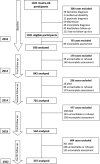Conventional and neuropsychological criteria for mild cognitive impairment show similar prognostic value for dementia across 12 years in a non-clinical setting
- PMID: 40473666
- PMCID: PMC12141691
- DOI: 10.1038/s41598-025-04275-y
Conventional and neuropsychological criteria for mild cognitive impairment show similar prognostic value for dementia across 12 years in a non-clinical setting
Erratum in
-
Correction: Conventional and neuropsychological criteria for mild cognitive impairment show similar prognostic value for dementia across 12 years in a non-clinical setting.Sci Rep. 2025 Jul 22;15(1):26571. doi: 10.1038/s41598-025-11549-y. Sci Rep. 2025. PMID: 40696001 Free PMC article. No abstract available.
Abstract
Making early and informative diagnoses of mild cognitive impairment (MCI) is highly important for planning timely and appropriate interventions aimed at dementia risk reduction. However, there is currently no agreement on the MCI criteria, leading to wide heterogeneity in the prognosis of MCI patients and high reversion rates. Our study aimed to compare the prognostic value of Conventional (Petersen/Winblad) and Neuropsychological (Jak/Bondi) criteria for the diagnosis of MCI. We directly compared the ability of each classification method to predict progression to dementia and the stability of the diagnosis over 12 years in a population-based sample of 1021 older adults without dementia. The relative impact of subjective complaints and objective impairment on clinical progression was further evaluated. Baseline MCI diagnosis with the Neuropsychological and Conventional criteria was associated with a comparable risk of dementia over time. Across the study period, the Neuropsychological criteria led to more consistent diagnoses (63.2% vs. 43.2%). The copresence of subjective memory complaints and objective impairment at baseline was associated with increased dementia risk within both diagnostic frameworks. These results further support the use of comprehensive neuropsychological assessment to make timely and appropriate MCI diagnoses and show the added prognostic value of subjective complaints.
Keywords: Conventional criteria; MCI diagnosis; Neuropsychological criteria; Progression to dementia; Stability; Subjective Memory Impairment.
© 2025. The Author(s).
Conflict of interest statement
Declarations. Competing interests: The authors have nothing to disclose.
Figures
Similar articles
-
18F PET with flutemetamol for the early diagnosis of Alzheimer's disease dementia and other dementias in people with mild cognitive impairment (MCI).Cochrane Database Syst Rev. 2017 Nov 22;11(11):CD012884. doi: 10.1002/14651858.CD012884. Cochrane Database Syst Rev. 2017. PMID: 29164602 Free PMC article.
-
Mini-Mental State Examination (MMSE) for the detection of Alzheimer's disease and other dementias in people with mild cognitive impairment (MCI).Cochrane Database Syst Rev. 2015 Mar 5;2015(3):CD010783. doi: 10.1002/14651858.CD010783.pub2. Cochrane Database Syst Rev. 2015. Update in: Cochrane Database Syst Rev. 2021 Jul 27;7:CD010783. doi: 10.1002/14651858.CD010783.pub3. PMID: 25740785 Free PMC article. Updated.
-
18F PET with florbetapir for the early diagnosis of Alzheimer's disease dementia and other dementias in people with mild cognitive impairment (MCI).Cochrane Database Syst Rev. 2017 Nov 22;11(11):CD012216. doi: 10.1002/14651858.CD012216.pub2. Cochrane Database Syst Rev. 2017. PMID: 29164603 Free PMC article.
-
Vitamin E for Alzheimer's dementia and mild cognitive impairment.Cochrane Database Syst Rev. 2017 Apr 18;4(4):CD002854. doi: 10.1002/14651858.CD002854.pub5. Cochrane Database Syst Rev. 2017. PMID: 28418065 Free PMC article.
-
Vitamin E for Alzheimer's dementia and mild cognitive impairment.Cochrane Database Syst Rev. 2017 Jan 27;1(1):CD002854. doi: 10.1002/14651858.CD002854.pub4. Cochrane Database Syst Rev. 2017. Update in: Cochrane Database Syst Rev. 2017 Apr 18;4:CD002854. doi: 10.1002/14651858.CD002854.pub5. PMID: 28128435 Free PMC article. Updated.
References
-
- Rennie, A. et al. Comparing three neuropsychological subgrouping approaches in subjective and mild cognitive impairment from a naturalistic multicenter study. Neurobiol. Aging129, 41–49 (2023). - PubMed
-
- Petersen, R. C. Mild cognitive impairment as a diagnostic entity. J Intern Med256, 183–194 (2004). - PubMed
MeSH terms
LinkOut - more resources
Full Text Sources
Medical



